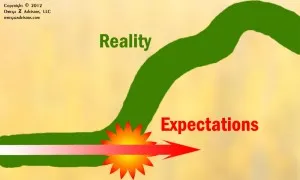Our Personalities: Crashing Others’ Expectations
As computers and robots are able to perform more of the mental and physical tasks of humans, we are finding they can become more unnerving to us. Why is that?
“Mapping the Uncanny Valley” (The Economist, July 21, 2012 edition) examines the work of Kurt Gray (University of North Carolina) and Daniel Wegner (Harvard) to find it’s a matter of expectations. We do not expect robots to be human – more specifically to have emotions – so when we observe or hear that they do, it unnerves us. They also found that humans who “did not feel emotion” unnerved us because we expect humans to have emotions.
Extrapolating, here’s the lesson for us:
When we don’t conform to the expectations of others, we will likely unnerve them.
How much will tend to be a function of the degree to which we crashed their expectations and the degree to which such crashing unnerves them. Some might find such crashing a refreshing departure from the norm, more likely not though.
As we saw with euphemisms, people tend to prefer their illusions to reality; thus, we could rephrase the powerful line, “You can’t handle the truth,” from the movie A Few Good Men to be, “You can’t handle the real me.” In other words, people will tend to prefer you think, feel, talk and behave according to their expectations rather than as you are.
For these people, societal, cultural and business conventions rescue them by providing rationalizations for this unnerving: it’s rational to be upset with violators of such conventions. In reality though, it’s an emotional response, a function of their personality.
Therefore, pragmatically, you will often need to weigh the risks of crashing their expectations. Your real aspect might just be too much for them.
Related posts:
- Computers Teaching Us About Being Human
- Programming Robots to Interact With Extroverts and Introverts


